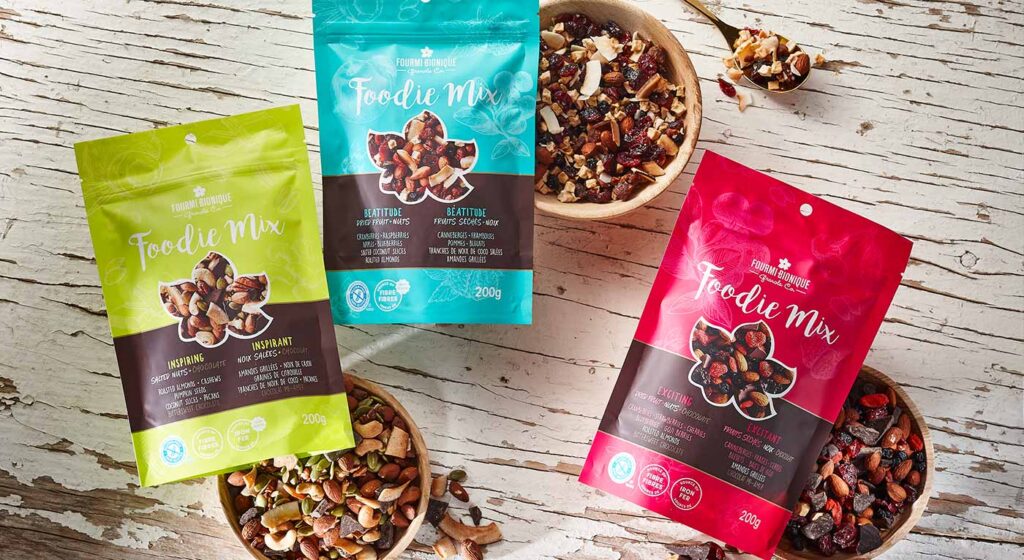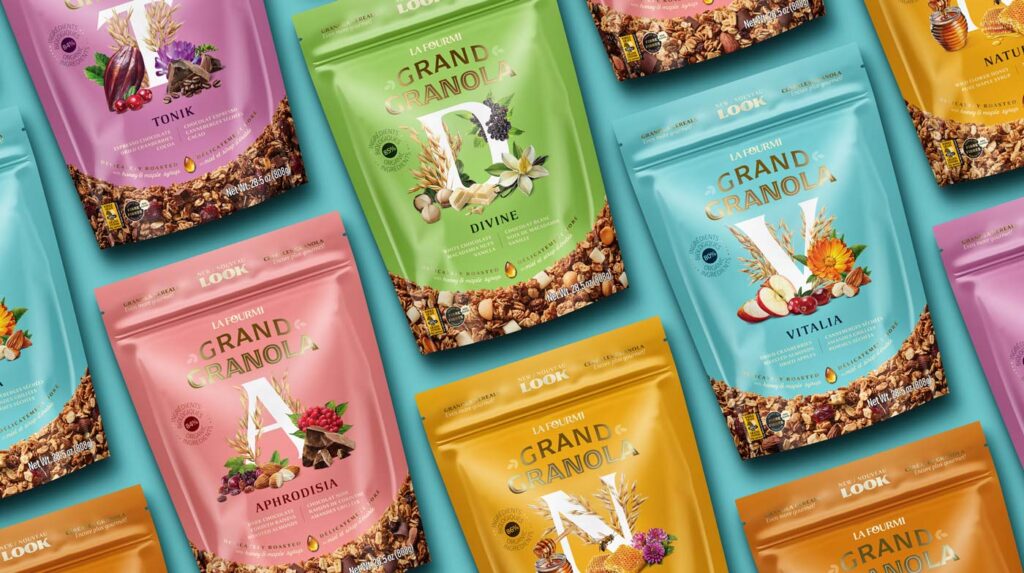Since 2017, we have been introducing our new product line, Nutbrown, little by little. Unlike Grand Granola, these are grain-free granolas produced in a grain-free environment. Today, 6 flavours exist, including 4 vegan ones. But why grain-free granola? Is a granola recipe without oats and other grains still tasty? We will answer all your questions in this article.
The Grand Granola line: full of high-quality whole grains
In our Grand Granola, you will find oats, spelt, rye and barley which have all been certified organic by Ecocert Canada. Traditionally, grains are the base of any self-respecting granola. They provide the crispy texture that we all know so well and they also are very nourishing. Grains are a staple food for most people, and Health Canada recommends that they be given the greatest importance in our diet, on the same level as vegetables, fruits and plant-based sources of protein. Source: Health Canada.
When we talk about grains, we mean whole grains above all! Our products that contain grains are all whole grain certified. Health Canada specifically recommends whole grains because they contain far more fibre than refined grains do. More info on whole grains.
Oats
Oats, for example, are rich in soluble fibre. They help lower blood cholesterol levels, control blood sugar, can regulate appetite and weight gain, and can prevent colon cancer. Source. Learn more about oats.
Spelt
Spelt, for its part, is rich in insoluble fibre. It has the great advantage of regulating bowel transit. If you don’t eat enough insoluble fibre, that can lead to constipation. An excess of insoluble fibre will have the opposite effect. Therefore, it is important to consume the right amount in order to benefit from good digestive health and prevent certain diseases. Spelt is rich in iron and protein, making it a great healthy choice, although its yield is lower than that of wheat, for example. Learn more about spelt.
Rye
Rye acts against cardiovascular disease and type 2 diabetes as well as cancer. Phytoestrogens, Sterols, Antioxidants, Alkylresorcinols, Phenolic Acids, Fibres… All of these elements with tongue-twisting names are allies for our health that are found in rye. Therefore, rye certainly deserves to be part of our diet! Learn more about rye.
Barley
Barley is also rich in soluble fibre and antioxidants. Learn more about barley.
In short, grains are essential for including fibre, antioxidants, proteins, vitamins, and minerals in our diets… they can also prevent certain diseases. So, why put them aside?

Why a grain-free granola?
There are several reasons that may cause some consumers to stay away from grains. First of all, skepticism. Some nutritionists, doctors, naturopaths, and sports coaches have contributed to the growth of grain-free products. This momentum is supported by nutritional arguments and the fear of gluten, which has become public enemy number one in the food industry this last decade.
Grain-free granola, gluten intolerance and celiac disease
We hear and sometimes get confused with all the different news about gluten intolerance. There’s a good reason for that: it can be used to explain pains of all kinds, a bit like Lyme disease.
Celiac disease is not the same as gluten intolerance. Celiac is an autoimmune disease, often hereditary, which causes attacks after the ingestion of gluten. As for gluten intolerance, it is estimated that 3 to 6% of the population has a non-celiac sensitivity to gluten. This group of people will develop symptoms similar to those of irritable bowel syndrome, but not as an immune response. Gluten intolerance is still poorly understood.
In both cases, it is important to stay away from gluten to avoid unpleasant or dangerous side effects: malnutrition, lactose intolerance, anemia, osteoporosis, kidney stones, etc. Learn more about celiac disease and gluten.
If you are affected, find out in this article which cereals are gluten-free.
Grain-free granola: Skeptics and healthy diets
The overuse of refined grains in recent decades has led to the association of cereals with junk food. Refined cereals are found in white flour, white rice, white pasta, white bread, couscous, and also in many processed industrial products. They are also easier to preserve, so there are fewer losses for the manufacturers who use them.
However, contrary to what the purity of their name indicates, they are less nutritious than their “raw” parents. In fact, whether by grinding or sieving the grains, the refining process removes grains’ bran and germ, which also removes the fibre and most of the precious vitamins and minerals. Refined grains also have more calories because they contain more carbohydrates. Learn more.
Another topic for debate: followers of the Paleo Diet believe that the human genome has not changed enough to tolerate the introduction of grains in our diet. More info in our article about this topic.




The Nutbrown grain-free granola line
We conceived the Nutbrown products first and foremost to offer an original, gourmet and healthy alternative to traditional granola. Almonds, sunflower seeds, cashews, sesame, flax, coconut… We use nuts and seeds that offer a wide variety of nutritional benefits, some of which are not found in traditional granola.
Almonds
Like other nuts, the almond contains unsaturated fatty acids, proteins, vitamins or minerals that would prevent cardiovascular diseases, certain cancers, Parkinson’s disease and even strengthen cognitive abilities. We can clearly call it a superfood! Learn more.
Sunflower, Sesame and Flax seeds
These three are all oilseeds and they contain, as their name suggests, good fats. Believe it or not, good fats are essential for the proper functioning of the body. Despite their higher caloric intake, these fats are satisfying and nutritionally dense. They allow for the maintenance of a balanced diet, as well as the prevention of some diseases such as heart disease, type 2 diabetes. They also contribute to a lower risk of gallstones, a lower risk of colon cancer in women, and have a cholesterol-lowering effect. Learn more.
Cashew nuts
Low in fat, cashews are nutritious and contribute to the maintenance of general good health. Indeed, like almonds, pistachios, pecans, and walnuts, they have a cholesterol-lowering effect and reduce the risk of cardiovascular disease, type 2 diabetes, gallstones, removal of the gallbladder and colon cancer in women. Cashews are a good source of Magnesium, Iron, Copper, Phosphorus, Manganese and Zinc. Learn more.
Coconut
Very popular for its taste and its many uses, coconut is a must in many recipes. Rich in good fats, fibre, iron and phosphorus, coconuts are filling and promote healthy intestinal transit. Learn more.
Now you see why a grain-free granola can be a great choice in nutritional terms. We are proud to offer you Nutbrown, as an original and tasty alternative, which has the texture of granola without containing grains. You can even use it to make gluten-free cookies at home.
We have developed a range of products that will satisfy everyone, including those who chose for one reason or another not to consume grains. So often, it is difficult to really enjoy food when following a restrictive diet. For us, pleasure is sacred, so enjoy Nutbrown!
And if you have some time on your hands, we also explain how to make your own grain-free granola at home, in this article.


